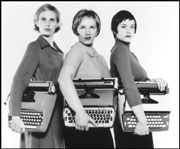DEAR DIANE
On the Boards, 100 W. Roy, 217-9888 $12-$14 9 p.m. Thurs.-Sun. ends Sun., June 17
IF YOU’RE ALREADY a fan of the Typing Explosion, you’ll get a kick out of Dear Diane, the literate go-go they’re throwing over at On the Boards. If not, you may assume you’ve opened the wrong door and interrupted some swinging little private love fest, though in the right mood you’re bound to let something grab you by the lapels and tug you in anyway.
The Diane of the title is actually a trio of secretarial namesakes played by the women of the Typing Explosion: Rachel Kessler, Sarah Paul Ocampo, and Sierra Nelson. The Explosion’s usual gig is public assembly-line poetry, pounding out punchy lines based on suggested titles (one favorite, “All I need”: “clean underwear/three inches of whiskey/and half your attention”). That collected verse is used here on projected slides and (sometimes too archly) as dialogue, with the three poets cast as implacable 9-to-5ers battling a lustily sadistic Bossy Boss (savvy Sarah Harlett).
The show’s press release labels it a satirical look at the “confining structures throughout the history of corporate America,” which turns out, luckily, to be just a heady way of saying it pokes fun at the workplace. Director Jamie Hook has imaginative notions about the inner lives of Everywoman, but he spares us any rhetoric and cuts loose, offering a three-piece backup band, Ocampo’s loopy whistle-and-bell choreography, and a polar bear that wanders around offering comfort and liquid refreshment. This is basically The Monkees for the caf頣rowd or an esoteric Pee Wee’s Playhouse—and yes, I mean that as a compliment.
The production couldn’t look any better than it does. Kathryn Rathke, whose idiosyncratic set designs (last seen in Egguus) are now officially reason enough to check out a show, works a small-scale wonder in the tiny studio space, plopping the women in the belly of a typewriter and framing them in a proscenium of keys.
As for the ladies themselves, they’re knockouts and can turn a catchy phrase, though if the evening is going to exploit all of its pop potential they need to puff up their distinct personalities to cover up what they’re lacking in acting skills. Neither the comic shtick with Bossy Boss nor the delivery of the poetry is disciplined enough, even on its own carefree terms, but it’s close. Ocampo’s almost there—every time she steps up to the mike to serenade us with rock poetics, the show is as perfectly cool and fun and hip as it wants to be.
KEELY AND DU
Nippon Kan Theatre, 628 S. Washington, 781-3905; $10-$12 8 p.m. Thurs.-Sat., 7 p.m. Sun. through Sat., June 30
KEELY AND DU, the pseudonymous Jane Martin’s episodic drama, puts a fine point on the opposing views in the abortion debate, then ricochets between them for two hours. It only works in patchy, obvious ways—it’s a bit of a crock, really—but it does work. Featuring a solid pair of central performances, Anthony Piana’s production for Stepping Stones gets respectable, often compelling results from the iffy material.
The setup, both in text and execution, is terrific. Matronly, unassuming Du (Mary Machala), following a morally questionable plan she believes to be for the greater good, is left as guardian to Keely (Morgan Rowe), a young woman who has been kidnapped and chained to a bed by “Operation Retrieval” to prevent the willful termination of her pregnancy. Machala’s troubled calm here feels remarkably immediate, and Rowe, clawing at her handcuffs like an angry animal, boasts an emotionalism that works as intelligent counterbalance.
The play yearns to comment on the complete lack of honest human dialogue about abortion, but its structure is finally a dramatic cheat, devolving into rather wanton contrivance for the sake of a point. It’s expected that the two women begin to understand each other when left to their own devices away from the political fray (which comes in the form of Rick Turner’s spot-on evangelical kingpin). But just when we’ve established some brief connection to Du’s earnestness or been moved by another revelation from Keely’s past (and Rowe does particularly well with the conflicted, volatile remembrances), the scene blacks out and the play moves forward in time. We’re given only the alternating top and bottom notes of what should be far moodier music.
Director Piana gets past all this—and a truly stupid metaphor in the form of a silent, wandering Doll (Simone Lawson)—with an unaffected handling of the play’s central suspense. We end up caring if, and how, both of these women can ever find freedom.








